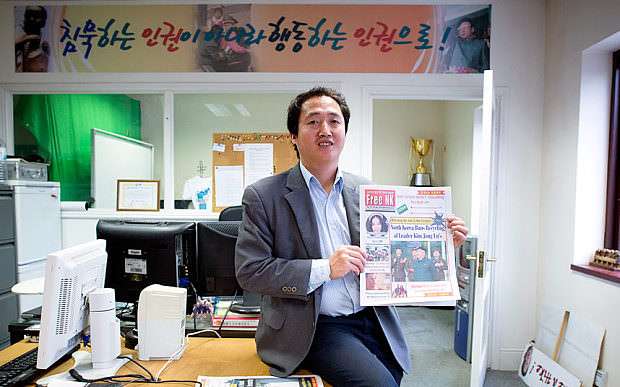North Korean Embassy Officials So Broke They Run Bootlegging Ops to Make Ends Meet

While waiting for the James Franco-Seth Rogen film The Interview to show up in some theaters on Christmas Day, let's construct a North Korean farce of our own using material in which Pyongyang burlesques itself.
There's promising source material in this (U.K) Telegraph story set in a community of some 700 North Korean refugees (mostly defectors) who have congregated in a part of Surrey called New Malden. The area is home to some 20,000 South Korean immigrants, who employ the northerners in their factories, shops, restaurants, and warehouses.
At the center of the Telegraph's account is one Joo-il Kim, a former army captain who defected in 2007. Mr. Joo-il runs an anti-regime tabloid, Free NK, whose offices are "stacked with crates of noodle cup-a-soups and a karaoke machine." Free NK adheres to the traditions of the British tabloid by mixing its stories about the horrors and absurdities of Kim Jong-un with headlines like, "British man speaks fluent Mandarin after waking up from coma."
Joo-il assumes he's being monitored by North Korea's diplomats, who have an embassy not far away. Indeed, Joo-il sometimes runs into these diplomats when they're shopping in the supermarket located in his office's building.
"When I saw them in the grocers, they didn't have enough cash for what they wanted," he told reporter Colin Freeman. "I offered them to lend them some but they said 'no'. To be honest, I actually feel sorry for them. Back in North Korea, we would have to look up to these people, but over here it seems they can't even afford to eat."
That, as they say, is too good to check. A defector—whose relatives at home may have been harshly punished by the regime because of his actions—offering to lend money to the sad-sack representatives of that same regime because they've been left broke. It's like something out of old dissident lit from Eastern Europe. Czech writers like Ludvik Vaculik (A Cup of Coffee with My Interrogator) or Bohumil Hrabal or Josef Skvorecky would have recognized the interplay of tyranny and pathos. We can hang the burlesque on either.
Why these diplomats are penniless is the subject of another, overlapping Colin Freeman story that appears in the same issue of the Telegraph. Pyongyang, he writes, expects all North Korean embassies to be "self-financing." The result is that North Korean officials in other countries have been "arrested for using their diplomatic status to run bootlegging and drug-dealing rackets." An impressive case occurred in 1976, when the North Korean embassy in Denmark tried to import 2.5 million cigarettes "for personal consumption."
That's sufficiently burlesque already, no? Plus, just as the Eastern European writers—especially Skvorecky—often used jazz scenes in their dissenting work, our New Malden script has a potential soundtrack of its own: the place is apparently full of karaoke bars. The rest of the script should be mere typing; it writes itself, playing out against a background of subversive capitalist lounge music.
Hollywoodize away: tangential love interests to pad things out, defections (and re-defections) real and pretended, an overplayed revenge scene, an ear-splitting chase, maybe even some topical hacking (Joo-il believes his paper was hacked by Pyongyang eight months ago), etc. Roll credits. Since we're trying to rise to the level of film-industry quality, don't skimp on the butt jokes.
Bear in mind that Joo-il Kim's personal story, however, is no joke. Back home, his niece died in a famine (along with millions of others), and he doesn't know whether the rest of his family is dead or alive; they may have been imprisoned or executed as a result of his defection. He says he was ready to kill himself during his escape rather than face capture. As far as he's concerned, "life in New Malden is just unimaginably better"than is life in North Korea.
By the way, while there are 700 North Koreans in New Malden alone, the U.S. admitted only 122 North Korean refugees between 2004 and 2011, and only 25 of those were granted asylum. Apparently, there's been some confusion regarding the status of refugees, since most are quickly granted South Korean citizenship, and may or may not remain eligible for asylum in the U.S.
Others intentionally avoid South Korea. Joo-il Kim, for example, was afraid that if he ended up in either South Korea or the U.S., his family would face the most severe reprisals, as they may have anyway.
Hat tip: Michael Jennings at Samizdata.


Show Comments (19)